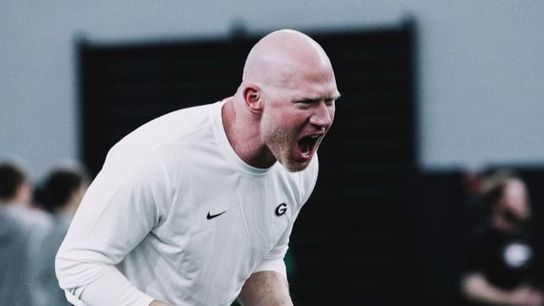Back by overwhelming demand, FootballScoop will once again examine the assistant coaching hires that will have the biggest impact on the college football season and the coaching job market in the 2020 season and beyond.
No. 20: Zach Arnett, Mississippi State
No. 19: Larry Fedora, Baylor
No. 18: Justin Hamilton, Virginia Tech
No. 17: Sean Gleeson, Rutgers
No. 16: Adam Fuller, Florida State
No. 15: Matt Lubick, Nebraska
No. 14: Mike Bobo, South Carolina
No. 13: Rhett Lashlee, Miami
No. 12: Marvin Lewis and Antonio Pierce, Arizona State
No. 11: David Ballou and Matt Rhea, Alabama
Who: Scott Cochran, Georgia
Title: Special teams coordinator
Previous stop: Alabama director of strength and conditioning (2008-19)
Why he's important: Well, here we go. This is really happening.
The most popular strength coach in the game -- arguably, the most popular in college football history, and the archetype of what a Hollywood screen writer would imagine in their head -- has pulled off a mid-stream career change. After 20 years prepare their bodies to perform once toe meets leather, Cochran is now responsible for that toe.
Before we move forward, let's not blow this move out of proportion. The majority of coaches is relating to players, and Cochran not only has his Ph.D. in that topic, he also teaches the class. He spent 13 years finding the right buttons to push on all 130-odd players on Alabama's roster, from walk-on offensive lineman to 5-star defensive back. His new job will be much the same, familiarizing himself with the entire roster in search of players who can block field goals, who can set up a kickoff return, who can cover punts.
That won't be an issue.
Recruiting won't be an issue, either.
It's the other part, the Xs and Os of special teams, that people are intrigued about, but Kirby Smart is not concerned his new coordinator will be deficient in that arena.
“He was always involved (at Alabama) in some way, shape or form with special teams,” Smart said in March. “That’s always been something, even dating back to my days at LSU, that he was kind of the quality-control guy at LSU that worked with special teams. So, his background has been around that.”
And, like most other schools, Cochran will simply lead a by-committee approach to special teams.
“We’ve certainly had a staff full of guys … who have all had special-teams duties in their career,” Smart said. “So this is not like Scott Cochran is the only special-teams guy on our staff. We have an immense amount of knowledge and experience on special teams. They’ll draw on that. Scott will be the special-teams coordinator. But we’ll use the entire staff to help with that, including me.”
Smart had better be right, though, because championships are won on the margins, and the margins often reveal themselves on special teams. For instance:
2015: Alabama manufactured two fourth quarter touchdowns off of special teams -- one off a recovered onside kick, the other on a 95-yard kick return score. The Tide wins the game, 45-40, putting rings on Smart and Cochran's fingers.
2017: A punt block that would have given Georgia the ball deep in Alabama territory with a 13-0 second half lead is (incorrectly) nullified due to an offside penalty. Alabama rallies to win, 26-23, denying Smart a ring while awarding one to Cochran.
2018: Tied at 28, Georgia attempts a fake punt, which fails. Alabama moves down the field to score a game-winning touchdown, handing Cochran an SEC championship ring and lifting Alabama to the Playoff while Smart and Georgia stayed home.
Recent history tells us Georgia's season could easily come down to a single special teams play, and for the first time in his career the strategy for that play -- either directly or indirectly -- will run through Cochran's bald head.
But there's a larger implication at play here than Georgia's pursuit of its first national title in 40 years, heavy as that is.
It's no secret Cochran made this move to check a necessary box to one day become a head coach. If his bet on himself proves unsuccessful, the consequence is clear: Cochran could easily find work again as a strength coach, should he so desire.
But if he succeeds, if Georgia blocks a couple punts, returns a kick or four for a touchdown and wins a national title, Cochran will become a head coach somewhere, and quickly. And in that, an entirely new path to becoming a head coach will be forged.
Will future Scott Cochrans even need on-the-field experience to become a head coach? How many strength coaches will change the way they view themselves and the way they perform their duties? What will that do to the already-super-competitive head coaching market?
None of those questions will be answered in 2020. But what happens in 2020 will help determined if they're ever asked in the first place.
